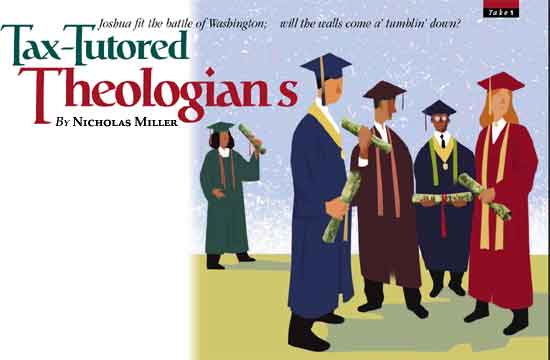Tax-Tutored Theologians - Part I
Nicholas P. Miller March/April 2004
Getting your Trinity Audio player ready...

What is the cost of discipleship? It cost Joshua Davey $2,500 when he decided to declare a major in pastoral studies.
Joshua won a Washington State scholarship based on academic achievement and financial need to pursue almost any field of study—including religion if he studied it from a dispassionate academic view at a place such as the University of Washington. But he would lose the scholarship if he chose to major in religion at a college that taught religion from a viewpoint of faith—such as the Assemblies-of-God-affiliated Northwest College, where Joshua was enrolled.
What is the cost of discipleship? It cost Joshua Davey $2,500 when he decided to declare a major in pastoral studies.
Joshua won a Washington State scholarship based on academic achievement and financial need to pursue almost any field of study—including religion if he studied it from a dispassionate academic view at a place such as the University of Washington. But he would lose the scholarship if he chose to major in religion at a college that taught religion from a viewpoint of faith—such as the Assemblies-of-God-affiliated Northwest College, where Joshua was enrolled.
The question is: in taking Joshua's scholarship away, was Washington state merely avoiding state sponsorship of religion—or was it guilty of invidious religious discrimination?

The High Court's ruling could create a sea change in the area of voucher law, making religious institutions not only eligible for vouchers, but requiring states to give vouchers to religious institutions if they provide them to secular organizations. For this reason, the case has attracted more than a dozen friend-of-the-court-briefs, representing scores of religious and civil rights groups across the country.
But despite the strong feelings on both sides of the dispute, Joshua's case seems a particularly difficult one for people to decide which side they are on. The right result seems to change depending on how the case is framed.
Thought of in terms of improper state support of religion, it seems to be a case at the center of the Constitution's prohibition against state funding of the church. What is more of a religious calling than that of the ministry? And how can one more directly support organized religion than to financially support those who preach and teach it, or are training to do so?
The founders strongly opposed tax funds going to ministers or teachers of religion. James Madison wrote his famed Memorial and Remonstrance Against Religious Assessments as a challenge to a bill to provide funds to all teachers of religion. Madison's arguments were so well received that not only was the bill defeated, but impetus was created to pass an opposing bill by Thomas Jefferson that explicitly prohibited tax funds from going to ministers.
Jefferson's bill, which became the Virginia Act for Establishing Religious Liberty, stated: "To compel a man to furnish contributions of money for the propagation of opinions which he disbelieves . . . is sinful and tyrannical, and even forcing him to support this or that teacher of his own religious persuasion, is depriving him of . . . liberty."
VA. CODE ANN.
Article Author: Nicholas P. Miller
Nicholas Miller, Ph.D., is an attorney and associate professor of church history at Andrews University, Berrien Springs, Michigan. He is the author of the The Religious Roots of the First Amendment (New York: Oxford University Press, 2012), which more fully develops the theme of this article.